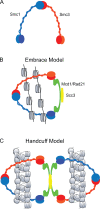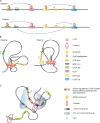Cohesinopathies, gene expression, and chromatin organization
- PMID: 20404106
- PMCID: PMC2856913
- DOI: 10.1083/jcb.200912129
Cohesinopathies, gene expression, and chromatin organization
Abstract
The cohesin protein complex is best known for its role in sister chromatid cohesion, which is crucial for accurate chromosome segregation. Mutations in cohesin proteins or their regulators have been associated with human diseases (termed cohesinopathies). The developmental defects observed in these diseases indicate a role for cohesin in gene regulation distinct from its role in chromosome segregation. In mammalian cells, cohesin stably interacts with specific chromosomal sites and colocalizes with CTCF, a protein that promotes long-range DNA interactions, implying a role for cohesin in genome organization. Moreover, cohesin defects compromise the subnuclear position of chromatin. Therefore, defects in the cohesin network that alter gene expression and genome organization may underlie cohesinopathies.
Figures



Similar articles
-
The expanding phenotypes of cohesinopathies: one ring to rule them all!Cell Cycle. 2019 Nov;18(21):2828-2848. doi: 10.1080/15384101.2019.1658476. Epub 2019 Sep 13. Cell Cycle. 2019. PMID: 31516082 Free PMC article. Review.
-
Cohesion and cohesin-dependent chromatin organization.Curr Opin Cell Biol. 2019 Jun;58:8-14. doi: 10.1016/j.ceb.2018.11.006. Epub 2018 Dec 11. Curr Opin Cell Biol. 2019. PMID: 30544080 Review.
-
Cohesin ties up the genome.Curr Opin Cell Biol. 2010 Dec;22(6):781-7. doi: 10.1016/j.ceb.2010.07.004. Epub 2010 Jul 31. Curr Opin Cell Biol. 2010. PMID: 20675112 Review.
-
Role of the DDX11 DNA Helicase in Warsaw Breakage Syndrome Etiology.Int J Mol Sci. 2021 Feb 25;22(5):2308. doi: 10.3390/ijms22052308. Int J Mol Sci. 2021. PMID: 33669056 Free PMC article. Review.
-
Mechanisms of cohesin-mediated gene regulation and lessons learned from cohesinopathies.Biochim Biophys Acta. 2014 Mar;1839(3):191-202. doi: 10.1016/j.bbagrm.2013.11.002. Epub 2013 Nov 22. Biochim Biophys Acta. 2014. PMID: 24269489 Free PMC article. Review.
Cited by
-
Cornelia de Lange Syndrome: NIPBL haploinsufficiency downregulates canonical Wnt pathway in zebrafish embryos and patients fibroblasts.Cell Death Dis. 2013 Oct 17;4(10):e866. doi: 10.1038/cddis.2013.371. Cell Death Dis. 2013. PMID: 24136230 Free PMC article.
-
Whole-exome sequencing analysis identifies risk genes for schizophrenia.Nat Commun. 2025 Aug 2;16(1):7102. doi: 10.1038/s41467-025-62429-y. Nat Commun. 2025. PMID: 40753099 Free PMC article.
-
Functional transcriptomics of a migrating cell in Caenorhabditis elegans.Proc Natl Acad Sci U S A. 2012 Oct 2;109(40):16246-51. doi: 10.1073/pnas.1203045109. Epub 2012 Sep 18. Proc Natl Acad Sci U S A. 2012. PMID: 22991463 Free PMC article.
-
Human cohesin compacts DNA by loop extrusion.Science. 2019 Dec 13;366(6471):1345-1349. doi: 10.1126/science.aaz4475. Epub 2019 Nov 28. Science. 2019. PMID: 31780627 Free PMC article.
-
Gain of DNA methylation is enhanced in the absence of CTCF at the human retinoblastoma gene promoter.BMC Cancer. 2011 Jun 10;11:232. doi: 10.1186/1471-2407-11-232. BMC Cancer. 2011. PMID: 21663659 Free PMC article.
References
Publication types
MeSH terms
Substances
LinkOut - more resources
Full Text Sources
Other Literature Sources

